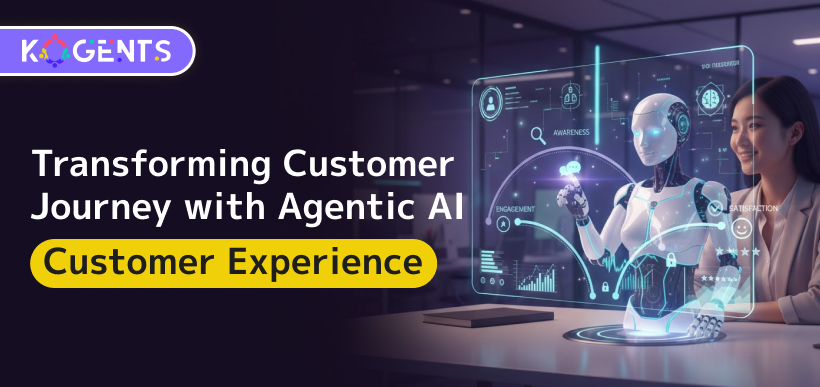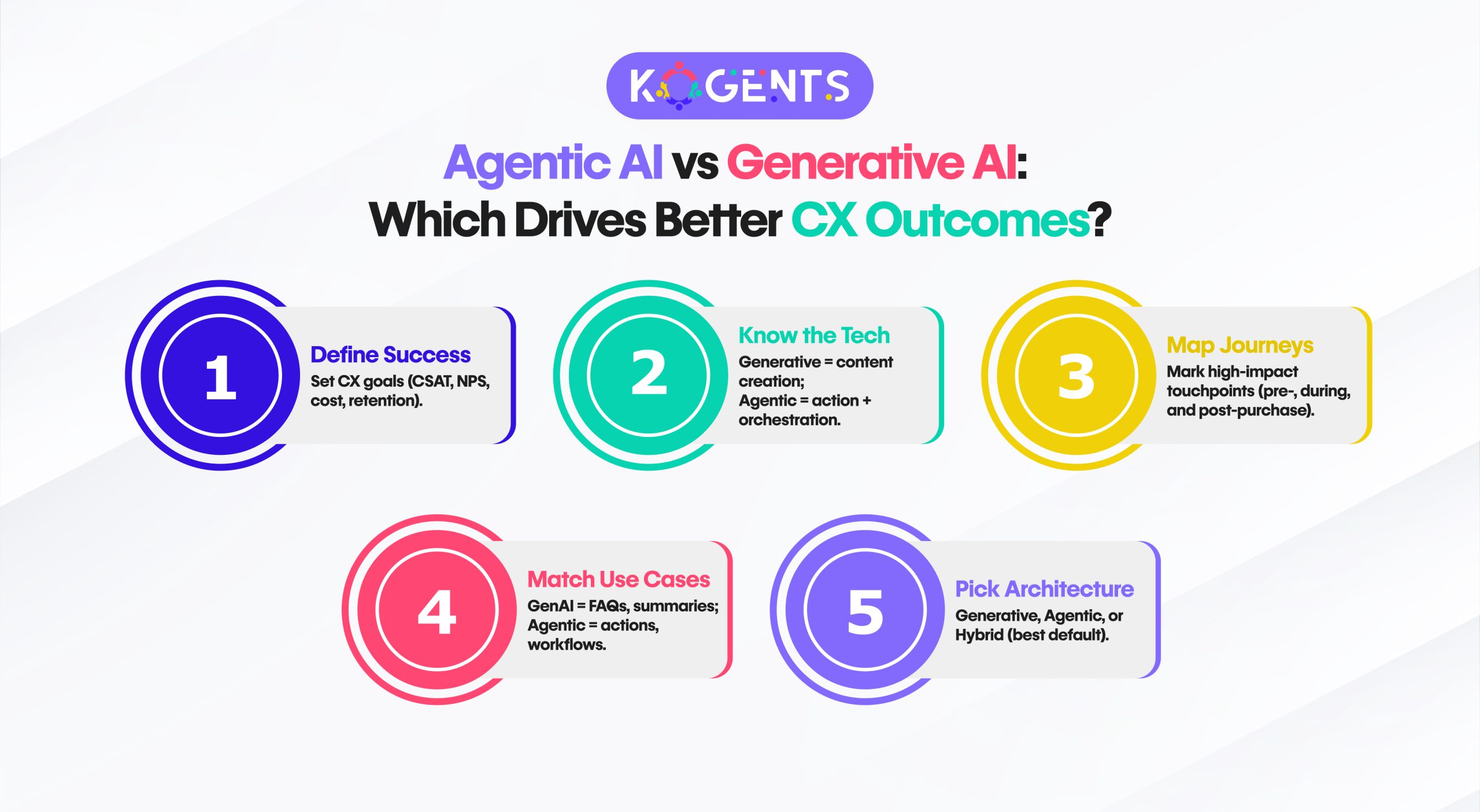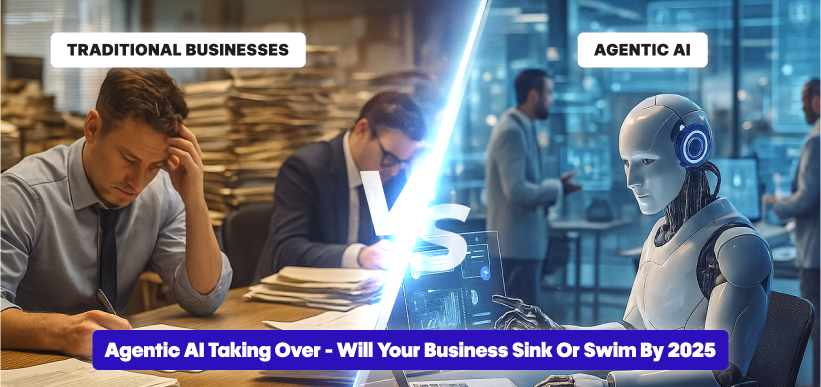Transforming Customer Journey with Agentic AI in Customer Experience

Summary:
Imagine a world where your customer experience is not just responsive, but proactive. Where your needs are anticipated, and solutions are delivered before you even realize you need them.
Well, this is no longer a futuristic dream, but a reality being shaped by agentic AI in customer experience.
Agentic AI systems can handle complex tasks, combine processes, and navigate problems without supervision, revolutionizing the way businesses interact with their customers.
By enabling autonomous problem-solving and proactive service delivery, companies can now create seamless customer journeys that adapt in real-time to changing circumstances and individual preferences.
So, if you are looking for something like that, then this blog is for you!
Key Takeaways
- Discover how agentic AI enables proactive customer service, anticipating needs before they arise.
- Explore the potential of AI systems that independently connect multiple processes and take action across various platforms.
- Learn how leading organizations leverage agentic AI for seamless customer journeys that adapt to changing circumstances.
- Understand the shift from reactive to proactive customer service AI agent models.
- Gain insights into how agentic AI differs from traditional AI solutions and its impact on customer experience.
Agentic AI: All Beyond Traditional AI Solutions!
You’re probably familiar with traditional AI solutions, but agentic AI represents a new frontier in AI technology, designed to transform customer interactions.
The moment you step into the world of agentic AI, you’ll discover how it’s revolutionizing the way businesses approach customer experience, making it more personalized and proactive.
Additionally, it is not just about processing data or generating responses, but:
- creating systems that can act autonomously
- making decisions based on context and
- past interactions
| Note: This autonomy is what sets agentic AI apart from its more traditional counterparts. |
What Is Agentic AI?
It refers to systems that are capable of independent action, driven by advanced machine learning models and significant data processing capabilities.
- These systems can interpret context, learn from past interactions, and adjust their responses accordingly, all without requiring constant human intervention.
- The capabilities of agentic AI are vast, ranging from controlling complex systems to communicating with third parties.
- This enables businesses to provide a more seamless and efficient customer experience, as agentic AI can handle a wide range of tasks, from simple queries to complex problem-solving.
Agentic vs. Generative AI: Key Differences
While generative AI is focused on creating new content based on prompts, agentic AI takes a more holistic approach.
It uses generative capabilities as just one tool among many, combining them with contextual understanding and machine learning to achieve autonomous action.
A report by McKinsey suggests that nearly eight in ten companies have deployed gen AI in some form, but roughly the same percentage report no material impact on earnings.1 We call this the “gen AI paradox.”
| Characteristics | Agentic AI | Generative AI |
| Primary Function | Autonomous action and decision-making | Content generation based on prompts |
| Contextual Understanding | Interprets context and adjusts actions accordingly | Limited to generating content based on input |
| Learning and Adaptation | Learns from past interactions to improve future actions | Improves based on the data it’s trained on |

The Impact of Agentic AI in Customer Experience
Agentic AI’s capabilities are enabling businesses to shift from a reactive to a proactive customer service model.
By leveraging this technology, companies can now anticipate and resolve customer issues before they become major problems, significantly enhancing the overall customer experience.
When deployed intelligently, agentic AI allows brands to proactively;
- Solve problems
- Deliver hyper-personalized interactions
- Create seamless experiences at scale,
- Build trust and loyalty with deeper emotional connections.
From Reactive to Proactive Customer Service
The traditional customer service model is reactive, responding to customer complaints and issues as they arise.
Agentic AI is transforming this model by enabling businesses to anticipate and address potential problems before they impact customers.
This proactive approach not only improves customer satisfaction but also reduces the workload for customer support agents, allowing them to focus on more complex issues.
By detecting potential issues in real-time and initiating resolution processes autonomously, agentic AI systems can significantly reduce the need for customers to report problems.
| Need for it? This proactive service is revolutionizing the customer experience by providing timely and relevant support, thereby enhancing customer trust and loyalty. |
Autonomous Problem-Solving Capabilities
It enables it to navigate complex customer issues by connecting information across multiple systems and data sources.
This allows businesses to deliver hyper-personalized interactions tailored to individual customer preferences, behaviors, and history.
As a result, companies can create seamless, human-centric experiences at scale that would be impossible to deliver through traditional service models.
Leading organizations are using agentic AI to build deeper customer trust and loyalty by demonstrating that they truly understand and value their customers.

How Agentic AI in Customer Experience Transforms the Customer Journey
The integration of agentic AI in customer experience is transforming how businesses interact with their customers.
By leveraging AI agents that can act autonomously, companies can now provide more personalized and proactive customer service.
Pre-Purchase: Personalized Recommendations and Assistance
Agentic AI revolutionizes the pre-purchase phase by delivering highly personalized recommendations based on individual preferences, browsing history, and similar customer profiles.
This not only enhances the customer experience but also increases the likelihood of conversion.
| Example: AI can analyze customer data to suggest relevant products or services, making the shopping experience more intuitive and engaging. |
| Benefits | Description |
| Personalized Recommendations | AI analyzes customer data to suggest relevant products or services. |
| Enhanced Customer Experience | Tailored experiences increase customer satisfaction and engagement. |
The Purchase Phase: Streamlining Transactions and Decisions
During the purchase phase, agentic AI streamlines transactions and simplifies complex decisions.
By providing real-time assistance that adapts to customer needs, AI helps remove friction points, making the purchase process smoother.
| Exemplary Reminder: AI-powered chatbots can answer customer queries instantly, reducing the time spent on resolving issues and improving overall service quality. |
Post-Purchase: Proactive Support and Issue Resolution
Here, agentic AI enables proactive support and issue resolution. AI can identify potential problems before they affect customers, allowing for timely intervention.
This proactive approach not only resolves issues quickly but also enhances customer experiences by demonstrating a company’s commitment to their satisfaction.
- Proactive issue detection and resolution
- Enhanced customer satisfaction through timely support
- Improved overall customer experience
| In-depth Analysis: As companies continue to adopt AI-driven solutions, the future of customer experience looks increasingly promising. |
Real-World Applications of Agentic AI in Customer Experience
In e-commerce and retail, agentic AI is being used to recover abandoned carts, personalize product recommendations, and manage inventory in real-time.
For instance, agentic AI systems can automatically send reminder emails or offer personalized discounts to customers who have left their carts unattended.
Additionally, these systems can analyze real-time supply data to automatically reorder stock and notify customers about new inventory arrivals.
- Personalized product recommendations based on customer behavior and preferences
- Automated inventory management to prevent stockouts and overstocking
- Proactive customer support through timely reminders and notifications
Financial Services Applications
In financial services, agentic AI is being used for:
- fraud detection
- personalized financial advice
- streamlined application processes
- analyze customer data to identify potential security threats and prevent fraudulent activities.
- Personalized financial planning and advice for customers
- Streamlined application processes for loans and credit cards
Additional Key benefits: Moreover, these systems can offer customized financial recommendations based on a customer’s financial history and goals.
Travel and Hospitality Implementations
In this scenario, agentic AI systems can make bookings across multiple websites and systems, bundle up detailed itineraries, and even update customers about flight delays or cancellations.
- Seamless booking experiences across multiple platforms
- Proactive itinerary management to minimize disruptions
- Personalized travel recommendations based on customer preferences
Implement Agentic AI in Your Customer Experience Strategy
Implementing agentic AI requires a thoughtful approach that aligns with your customer experience goals.
As you proceed further on this journey, it’s essential to consider several key factors that will influence the success of your agentic AI implementation.
Assessing Your Organization’s AI Readiness
Before diving into agentic AI, you need to assess your organization’s readiness. This involves examining your existing data infrastructure, technical capabilities, and organizational culture.
Your organization’s AI readiness is crucial in determining how effectively you can implement and benefit from agentic AI. Consider the following factors:
- Data quality and availability
- Technical infrastructure and scalability
- Employee skills and training needs
- Organizational culture and adaptability
Building the Right Data Infrastructure
Agentic AI is only as powerful as the data it consumes. To deliver value, agentic AI needs access to high-quality, relevant customer and operational data. Building the right data infrastructure is critical. This may involve:
- Data integration across silos and platforms
- Data quality improvement initiatives
- Establishing data governance policies
One of the key advantages of using a platform like Genesys Cloud AI is its pre-built, contextualized data systems.
| Key point: These systems can eliminate the heavy lifting typically required for AI readiness, allowing you to rely on the provider to do the hard work for you. |
Integration with Existing Customer Service Systems
Seamless integration with your existing customer service systems is vital to avoid disruption to current processes.
This includes integrating agentic AI with your CRM, ticketing systems, and other customer touchpoints.
A well-planned integration strategy ensures that agentic AI enhances your customer experience without causing operational disruptions.
| Integration Considerations | Benefits |
| API connectivity | Enables seamless data exchange between systems |
| Workflow automation | Streamlines customer service processes |
| Data synchronization | Ensures consistency across all customer touchpoints |
Balance Automation and Human Touch Simultaneously
As you integrate agentic AI into your customer experience strategy, finding the right balance between automation and human touch becomes crucial.
The goal is to leverage AI for efficiency while maintaining the emotional connection that human agents provide.
Deploying AI agents can actually bolster human connection by handling mundane, day-to-day tasks involved in customer support.
This frees up human agents to focus on complex, emotionally nuanced interactions where the human touch is necessary.
The Human-AI Collaboration Model
In this model, AI handles routine, data-intensive tasks, while humans focus on tasks that require empathy and complex problem-solving.
For instance, AI can manage initial customer inquiries, providing quick responses to common questions.
Meanwhile, human agents can step in to resolve more intricate issues, offering personalized support.
By dividing tasks in this manner, companies can create a seamless customer experience that combines the strengths of both AI and human agents.
Ethical Considerations and Trust Building
As agentic AI becomes more embedded in customer service, ethical concerns around data privacy and transparency come to the forefront.
To build trust, businesses must be transparent about AI use, protect customer data diligently, and clearly inform users how their data is being used.
By prioritizing these ethical considerations, companies can create AI-powered experiences that customers trust.
This involves maintaining options for human interaction when preferred and ensuring consistent performance.
| Key Considerations | Benefits | Implementation Strategies |
| Balancing AI and Human Touch | Enhanced Customer Experience | Divide tasks between AI and humans based on complexity and emotional nuance. |
| Ethical AI Use | Building Customer Trust | Ensure transparency, protect customer data, and maintain human interaction options. |
| Data Privacy | Compliance and Trust | Implement robust data protection measures and clearly communicate data use. |
Transform Your Customer Experience with Agentic AI Today!
As businesses look to transform their customer journeys, the role of agentic AI in customer experience has been enhanced and cannot be overstated.
As agentic AI continues to evolve, it will orchestrate entire customer journeys across multiple touchpoints and systems, enhancing customer interactions and driving business growth.
To capitalize on this transformative potential, businesses must prepare for the integration of agentic AI into their customer experience strategies, ensuring they can deliver exceptional customer experiences that drive long-term success.
So, for a secure future, collaborate with Kogent AI now. Please call us at (267) 248-9454 or email us at info@portal.kogents.ai.
FAQs
What is the primary benefit of using agentic systems for customer service?
The primary benefit is the ability to provide autonomous problem-solving capabilities, allowing for faster and more efficient issue resolution.
How do agentic AI systems handle complex customer queries?
Agentic AI systems use natural language processing to understand and respond to complex customer queries, providing accurate and relevant solutions.
Can agentic AI be integrated with existing customer service systems?
Yes, agentic AI can be integrated with existing customer service systems, enabling a seamless and efficient customer experience.
How does agentic AI impact inventory management and order fulfillment?
Agentic AI can help optimize inventory management and order fulfillment by providing real-time updates and automating routine tasks.
What are some common use cases for agentic AI in e-commerce?
Common use cases include personalized recommendations, proactive support, and streamlining transactions.
How can businesses ensure trust and transparency when implementing agentic AI?
Businesses can ensure trust and transparency by being open about their use of agentic AI, providing clear explanations of how it works, and ensuring that human agents are available to handle complex issues.

Kogents AI builds intelligent agents for healthcare, education, and enterprises, delivering secure, scalable solutions that streamline workflows and boost efficiency.